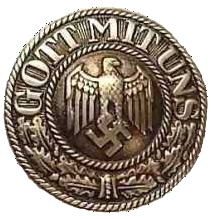the service of their personal interests and, debasing it to the level of their own miserable heroism, no longer struggled for the triumph of the original idea. The fire of the first fervour died out, the fighting spirit flagged and, as the bourgeois world is accustomed to say very justly in such cases, the party mixed water with its wine.
For this reason it is necessary that a movement should, from the sheer instinct of self-preservation, close its lists to new membership the moment it becomes successful. And any further increase in its organization should be allowed to take place only with the most careful foresight and after a painstaking sifting of those who apply for membership. Only thus will it be possible to keep the kernel of the movement intact and fresh and sound. Care must be taken that the conduct of the movement is maintained exclusively in the hands of this original nucleus. This means that the nucleus must direct the propaganda which aims at securing general recognition for the movement. And the movement itself, when it has secured power in its hands, must carry out all those acts and measures which are necessary in order that its ideas should be finally established in practice.
With those elements that originally made the movement, the organization should occupy all the important positions that have been conquered and from those elements the whole directorate should be formed. This should continue until the maxims and doctrines of the party have become the foundation and policy of the new State. Only then will it be permissible gradually to give the reins into the hands of the Constitution of that State which the spirit of the movement has created. But this usually happens through a process of mutual rivalry, for here it is less a question of human intelligence than of the play and effect of the forces whose development may indeed be foreseen from the start but not perpetually controlled.
All great movements, whether of a political or religious nature, owe their imposing success to the recognition and adoption of those principles. And no durable success is conceivable if these laws are not observed.
As director of propaganda for the party, I took care not merely to prepare the ground for the greatness of the movement in its subsequent stages, but I also adopted the most radical measures against allowing into the organization any other than the best material. For the more radical and exciting my propaganda was, the more did it frighten weak and wavering characters away, thus preventing them from entering the first nucleus of our organization. Perhaps they remained followers, but they did not raise their voices. On the contrary, they maintained a discreet silence on the fact. Many thousands of persons then assured me that they were in full agreement with us but they could not on any account become members of our party. They said that the movement was so radical that to take part in it as members would expose them to grave censures and grave dangers, so that they would rather continue to be looked upon as honest and peaceful citizens and remain aside, for the time being at least, though devoted to our cause with all their hearts.
And that was all to the good. If all these men who in their hearts did not approve of revolutionary ideas came into our movement as members at that time, we should be looked upon as a pious confraternity to-day and not as a young movement inspired with the spirit of combat.
The lively and combative form which I gave to all our propaganda fortified and guaranteed the radical tendency of our movement, and the result was that, with a few exceptions, only men of radical views were disposed to become members. It was due to the effect of our propaganda that within a short period of time hundreds of thousands of citizens became convinced in their hearts that we were right and wished us victory, although personally they were too timid to make sacrifices for our cause or even participate in it.
Up to the middle of 1921 this simple activity of gathering in followers was sufficient and was of value to the movement. But in the summer of that year certain events happened which made it seem opportune for us to bring our organization into line with the manifest successes which the propaganda had achieved.














